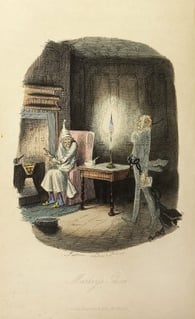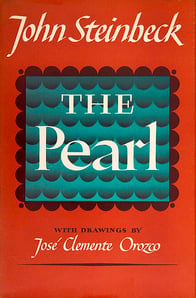The Deadly Sin of greed is the excessive desire for material possessions and wealth. Although greed does not cause physical addiction, it does cause a psychological obsession that leads to an insatiable desire for more.
The greedy person reaches a point where they are willing to cheat, steal, defraud, and exploit the vulnerable to obtain unnecessary material gain.
Although those prone to greediness primarily desire more simply to “have more,” they secondarily have the ego-centric desire to have more to “be more” than others.
The Deadly Sin of Greed in Literature
If one gives in to its lure, greed takes over more and more of the human psyche. It can become the dominant perspective from which one views self, the world, and others. As greed continues to seduce the individual, it blocks out empathy, respect, and compassion—and as it grows—even conscience and the desire for a relationship with God.
The insatiability of greed makes it expansive. The more one gets, the more one wants.
Is there any way out of the seduction of greed? There is—namely, a crisis of meaning, emotional, existential, economic, relationship, family, and/or community crises.
A crisis can be the best thing that ever happened to a person struggling with greed because it causes a rethinking of life’s meaning, fulfillment, and destiny. This, in turn, leads to the discovery (or, in many cases, the rediscovery) of the goodness of love, family, integrity, and God.
This point is illustrated well in both scripture and literature, particularly in Charles Dickens's A Christmas Carol, Robert Bolt’s Man for All Seasons, and John Steinbeck's The Pearl.
Depicting the Deadly Sin of Greed in Charles Dicken's Christmas Masterpiece
 Marley's ghost, from Charles Dickens: "A Christmas Carol."
Marley's ghost, from Charles Dickens: "A Christmas Carol." Charles Dickens provides one of the best literary studies of the heart and mind of greed in virtually every one of his novels concerning England during the Industrial Revolution. However, the epitome of greed is best illustrated by Ebenezer Scrooge in A Christmas Carol.
One might view Scrooge’s change of heart as a bit artificial because he can benefit from a privilege that most greedy people will not have—visits by four ghosts—Dickens’ conversion story has an undercurrent of realism.
To escape greed, one needs a “wake-up call,” typically in the form of a crisis. For Scrooge, the crisis appears in the form of the four ghosts, who disrupt his life and cause him to reexamine what makes life truly worth living.
As with the ghosts, crises do not force one to take action; they only challenge an individual towards action. Crises, like Scrooge’s ghosts, can lead to despair or a genuine change of heart. After this, only one thing remains: to develop goals, virtues, and prayer to solidify that change so that any sort of regression will be difficult, if not quasi-impossible.
Rejecting the Deadly Sin of Greed in 'A Man For All Seasons'
An example of greed drawn from history, literature, and the Bible comes from Robert Bolt’s A Man for All Seasons.
Saint Thomas More quotes scripture when he confronts Richard Rich, who has falsely accused More (consigning him to death) in order to obtain Lordship over Wales. More asks him:
“It profits a man nothing to give his soul for the whole world… but for Wales, Richard?”
—St. Thomas More
The Bible’s teaching is clear: we risk heaven when we allow ourselves to be consumed with the goods of this world. To break the spell of greed, we must focus on life’s higher purpose and open ourselves to the Lord who saves us.
The Deadly Sin of Greed's Destructive Nature in 'The Pearl'
The fable-like novella Steinbeck’s The Pearl tells of Kino, a lowly pearl diver, who finds a pearl the size of a seagull’s egg.
 Dust jacket designed by Robert Hallock. Published by Viking Press., Public domain / via Wikimedia Commons
Dust jacket designed by Robert Hallock. Published by Viking Press., Public domain / via Wikimedia Commons
In this one, Pearl Kino sees a whole new life, where his son will get an education, and he and his wife will finally get a church wedding. From that point on, Kino makes all his decisions in view of the pearl.
However, the pearl brings nothing but destruction. Thieves burn down Kino’s house, searching for the pearl, and Kino kills one of the thieves in self-defense. As if these crises were not enough for Kino to rid himself of the pearl, he then flees the town with his wife, child, and the pearl with trackers on his heels.
When asked by his brother to leave the pearl behind, Kino responds:
“I have it. And I will keep it. I might have given it as a gift, but now it is my misfortune and my life and I will keep it.”
The pearl has become Kino’s world.
The fable culminates with a final crisis: Kino’s son is shot by one of the trackers. Only at this point is Kino able to see the pearl's destructiveness and finally throws it back to the ocean’s depths.
Although “The Pearl” is a fable, and thus much more black and white than real life, one still sees through Kino that greed blinds us to destructiveness. Even if greed’s victim can resist this final seduction, it still leaves tremendous harm and destruction.
Concluding the Deadly Sin of Greed
There are many more examples of greed in literature, but these three show how one falls into greed, its adverse effects and destructiveness, and the crisis that awakens one to pull out. Without such crises, greed’s spell can be so powerful that it prevents the discovery of all higher purpose, dignity, fulfillment, and destiny.
*Originally Published on August 31, 2020

